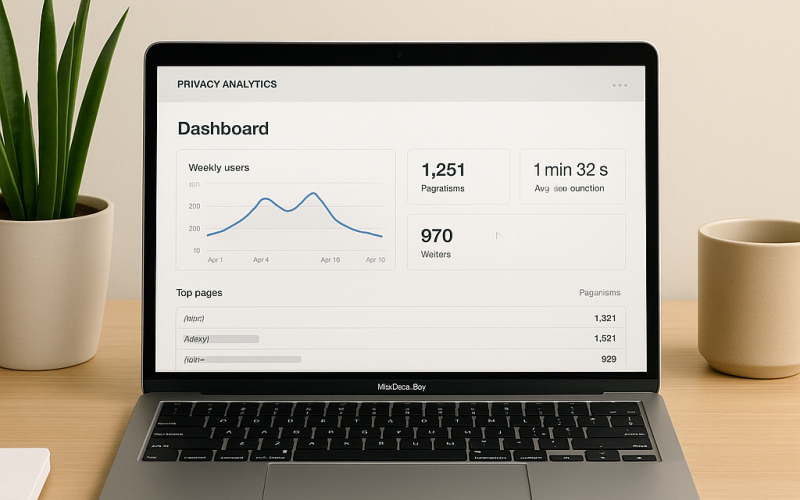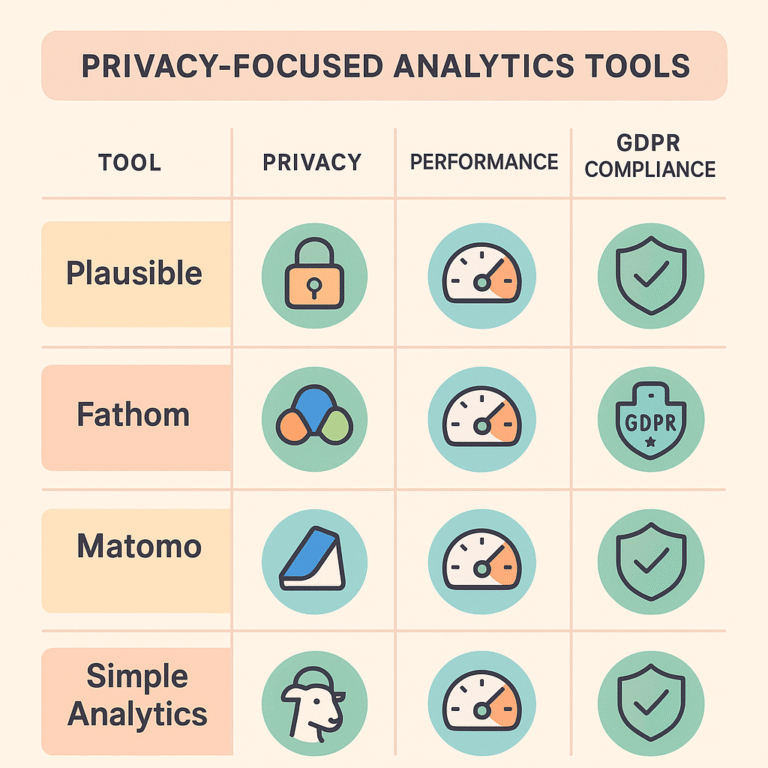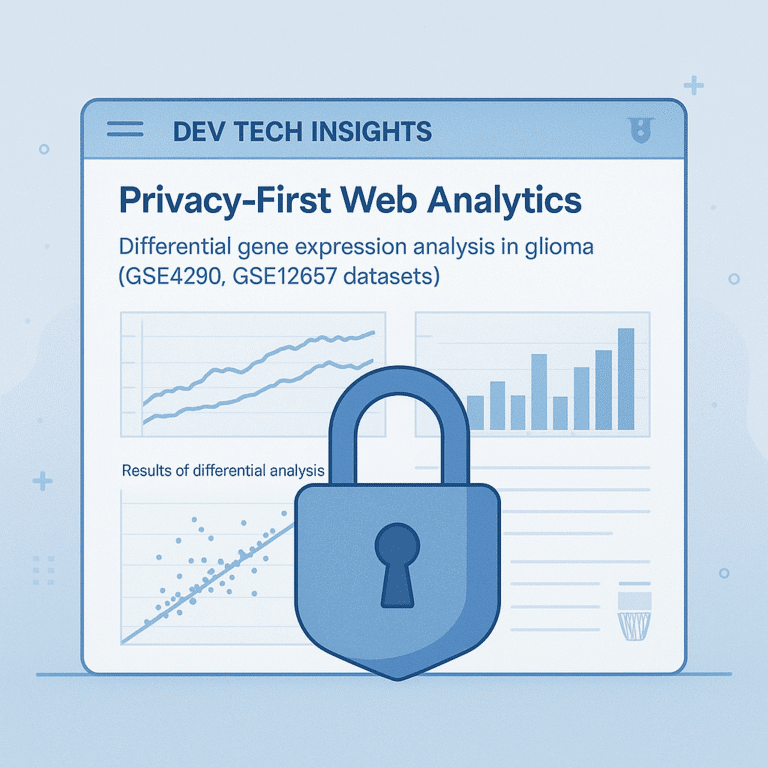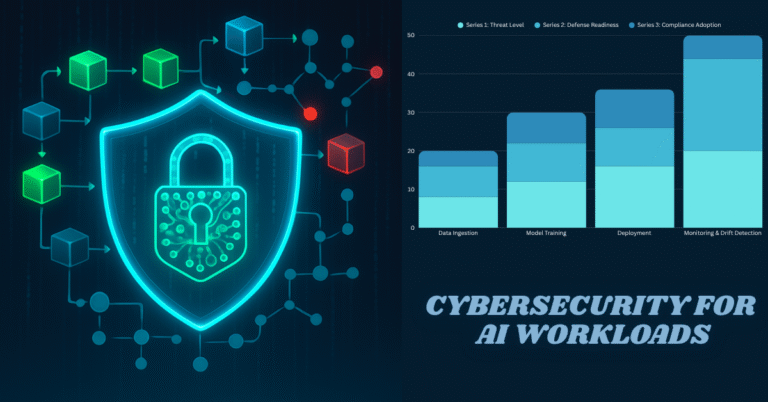
🛡️ Privacy-Focused Web Analytics Tools You Should Try in 2025
In 2025, user data privacy is no longer just a compliance checkbox—it’s a core part of your brand’s trust. With increasing scrutiny over how data is collected, stored, and shared, privacy-focused analytics tools are on the rise. These tools help you monitor your website performance without compromising user privacy or falling afoul of regulations like GDPR, CCPA, and ePrivacy.
In this post, we’ll explore the top privacy-first web analytics tools you should consider switching to in 2025.
Need Fast Hosting? I Use Hostinger Business
This site runs on the Business Hosting Plan. It handles high traffic, includes NVMe storage, and makes my pages load instantly.
Get Up to 75% Off Hostinger →⚡ 30-Day Money-Back Guarantee
🔍 Why Privacy-Focused Analytics Matter in 2025
🌐 Stricter data laws: Regulators are cracking down on invasive tracking.
🔒 User expectations: Visitors demand transparency and consent.
🚫 Cookieless future: Major browsers block third-party cookies by default.
✅ Better performance: Lightweight tools boost site speed and UX.

📈 Top Privacy-Focused Analytics Tools in 2025
Here’s a curated list of analytics platforms that prioritize user privacy without sacrificing insight:
1. Plausible Analytics
Privacy Model: No cookies, GDPR/CCPA compliant
Strengths: Simple dashboard, open-source, lightweight (under 1 KB)
Pricing: Starts at $9/month
Use Case: Bloggers, startups, SaaS
2. Fathom Analytics
Privacy Model: No cookies, data anonymized
Strengths: Clear dashboard, uptime reports, EU-based hosting
Pricing: Starts at $14/month
Use Case: Privacy-first businesses, indie hackers
3. Simple Analytics
Privacy Model: Cookie-free, GDPR compliant
Strengths: Beautiful reports, event tracking, Twitter referrer insights
Pricing: From $19/month
Use Case: Marketers, freelancers, indie websites
4. GoatCounter
Privacy Model: No cookies, optional self-hosting
Strengths: Lightweight, privacy-respecting, free tier
Pricing: Free (open-source) or hosted plans
Use Case: Developers, open-source projects
Useful Links
- Forget Selenium: Building AI Agents with browser-use & DeepSeek (The New 2026 Standard)
- The End of Localhost? Why Cloud Dev Environments (CDEs) Are Taking Over
- Cybersecurity for AI Workloads: Protecting ML Pipelines in 2025 and Beyond
- AI-Native Grads vs. Traditional Developers: The Talent War CEOs Are Betting On
- Google’s New Ranking Factor Is Quietly Killing Small Developer Blogs (2025 Guide)
- 📛 What Developers Should Stop Doing in 2025 (And What to Do Instead)
5. Matomo (On-Premise)
Privacy Model: Self-hosted, fully data-owned
Strengths: Extensive features, eCommerce tracking, full compliance
Pricing: Free (self-hosted)
Use Case: Enterprises, advanced users, compliance-heavy sites
📊 Comparison Table
| Tool | Cookie-Free | GDPR-Compliant | Hosting | Starting Price | Best For |
|---|---|---|---|---|---|
| Plausible | ✅ | ✅ | Cloud (EU) | $9/month | Blogs, startups |
| Fathom | ✅ | ✅ | Cloud (EU) | $14/month | Businesses, creators |
| SimpleAnalytics | ✅ | ✅ | Cloud (EU) | $19/month | Marketers, freelancers |
| GoatCounter | ✅ | ✅ | Cloud / Self | Free | Devs, open-source |
| Matomo | ❌ (uses cookies) | ✅ | Self-hosted | Free | Enterprise, compliance |

🔧 Key Features to Look for in Privacy Analytics
✅ Cookieless tracking
✅ EU-based or local data centers
✅ No PII collection or fingerprinting
✅ Clear privacy policy and compliance docs
✅ Lightweight scripts (<100KB preferred)

❓ FAQ: Privacy-Focused Analytics in 2025
Q1: Are privacy-focused analytics tools accurate without cookies?
Yes. These tools use IP hashing, server logs, and referrer headers for statistical tracking without compromising user identities.
Q2: Will switching affect my SEO?
No. These tools only track visitor behavior and don’t interfere with how Google crawls your site.
Q3: Can I track conversions and goals without cookies?
Most privacy tools support basic goal tracking via URL patterns or event-based analytics.
Q4: What about user consent banners?
If you go fully cookieless, you may not need a cookie banner—confirm with your legal counsel.
🧠 Final Thoughts
Privacy-focused analytics tools are not just ethically superior—they also simplify compliance, improve site performance, and show your users that their data matters.
Whether you’re running a small blog or managing a business website, these tools offer a better alternative to legacy platforms like Google Analytics.
Make the switch in 2025—and stay ahead of both tech and regulation.

🚀 Let's Build Something Amazing Together
Hi, I'm Abdul Rehman Khan, founder of Dev Tech Insights & Dark Tech Insights. I specialize in turning ideas into fast, scalable, and modern web solutions. From startups to enterprises, I've helped teams launch products that grow.
- ⚡ Frontend Development (HTML, CSS, JavaScript)
- 📱 MVP Development (from idea to launch)
- 📱 Mobile & Web Apps (React, Next.js, Node.js)
- 📊 Streamlit Dashboards & AI Tools
- 🔍 SEO & Web Performance Optimization
- 🛠️ Custom WordPress & Plugin Development
One comment
Leave a Reply
You must be logged in to post a comment.








[…] 👉 Related: Privacy-Focused Web Analytics Tools You Should Try in 2025 […]